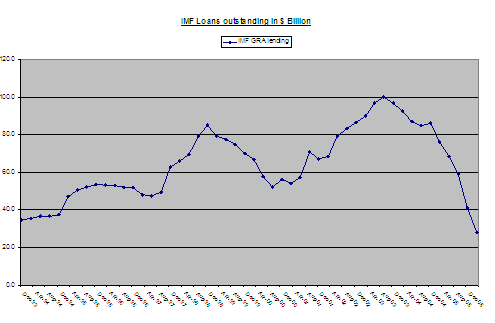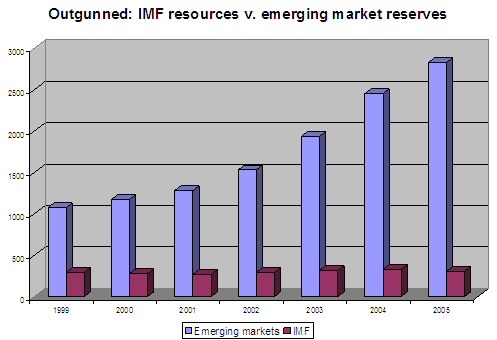John Taylor’s rhetoric on the IMF drives me nuts
More on:
Taylor seems to really think his under his watch, the "Bush Administration ended the bailout habits of the IMF"
As Taylor notes in the Journal, the Taylor-led US Treasury did say no to Argentina in late 2001. But Taylor said no in December of 2001 only after saying yes to a horribly ill-conceived augmentation (increase in IMF lending) in the summer of 2001.
The IMF has stated that it intends to stick to its access limits. Of course, it also has a policy that allows it to go over its access limits whenever it and its major shareholders decide they want to. And every time a big emerging economy gets into trouble, they want to. The IMF hasn't given out any big loans recently, tis true. But that is because no one has gotten into trouble, not because the IMF and its big shareholders have stuck to the stated lending limits under pressure.
Right now, the market in its wisdom will throw oodles of money at any emerging economy that offers a bit of carry. Capital flows are back at their pre-Asian crisis peak.
As for Taylor's real record, I think the facts speak for themselves. He approved a large augmentation for Argentina, and large loans for Turkey, Uruguay and Brazil.
Look at the following graph. The first peak in IMF loans outstanding occurred in late 1998 and early 1999, after Asia, Russia and Brazil all turned to the Fund. The second peak occurred in 2003, under John Taylor's watch. IMF loans outstanding went from say $60b to $100b. The IMF actually lent out more during that period to Argentina, Uruguay, Brazil and Turkey, but Russia and some Asian countries were repaying the fund over that period.

Facts are facts. Taylor could take credit for the IMF's successes in Brazil, Uruguay and Turkey. All three countries avoided default, regained access to markets, returned to growth and repaid the IMF. I would submit the current emerging market boom wouldn't have happened had Brazil defaulted in 2002 or early 2003. And without the IMF lifeline, that is exactly what would have happened. Taylor can even take credit for lending out the IMF's money to countries that subsequently repaid the Fund. But Taylor can not credibly take credit for scaling back IMF lending.
Yet Taylor consistently refuses to claim credit for the successes he did have, and insists on trying to get credit for something he didn't do - scale back IMF lending!
Of course, right now, the big debate around the IMF has nothing to do with lending. The emerging markets of the world now generally have too many reserves, not too few. That means that the IMF's core asset - its ability to lend reserves to countries that are short on reserves - is depreciating in value.
The IMF's problem isn't that it is "small" in relation to private capital flows, as is often argued. In Turkey and Uruguay, I think you can make a good case that the IMF mobilized enough money (over 10% of each country's GDP) to overwhelm private markets in all but the most dire of scenarios. The IMF's problem is that its resources increasingly look to be "small" relative to those of its emerging market members!

The IMF has yet to find a way to engage meaningfully on the core challenges facing the current international monetary and financial system. I would argue that is in large part because it hasn't been willing to try. Though maybe its biggest members are also not willing to listen. More on that later.
More on:
 Online Store
Online Store
